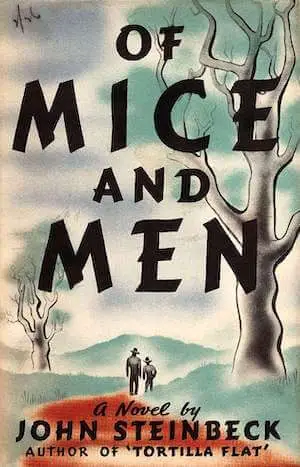The most carefully prepared plans may go wrong.
The best laid schemes of mice and men
What's the meaning of the phrase 'The best laid schemes of mice and men'?
What's the origin of the phrase 'The best laid schemes of mice and men'?
his novel from the ‘The best laid
schemes of mice and men’ line
in Robert Burns’ poem ‘To a Mouse’.
From Robert Burns’ poem To a Mouse, 1786. It tells of how he, while ploughing a field, upturned a mouse’s nest. The resulting poem is an apology to the mouse:
Wee, sleeket, cowran, tim’rous beastie,
O, what a panic’s in thy breastie!
Thou need na start awa sae hasty,
Wi’ bickerin brattle!
I wad be laith to rin an’ chase thee
Wi’ murd’ring pattle!I’m truly sorry Man’s dominion
Has broken Nature’s social union,
An’ justifies that ill opinion,
Which makes thee startle,
At me, thy poor, earth-born companion,
An’ fellow-mortal!I doubt na, whyles, but thou may thieve;
What then? poor beastie, thou maun live!
A daimen-icker in a thrave
’S a sma’ request:
I’ll get a blessin wi’ the lave,
An’ never miss ’t!Thy wee-bit housie, too, in ruin!
It’s silly wa’s the win’s are strewin!
An’ naething, now, to big a new ane,
O’ foggage green!
An’ bleak December’s winds ensuin,
Baith snell an’ keen!Thou saw the fields laid bare an’ waste,
An’ weary Winter comin fast,
An’ cozie here, beneath the blast,
Thou thought to dwell,
Till crash! the cruel coulter past
Out thro’ thy cell.That wee-bit heap o’ leaves an’ stibble
Has cost thee monie a weary nibble!
Now thou’s turn’d out, for a’ thy trouble,
But house or hald,
To thole the Winter’s sleety dribble,
An’ cranreuch cauld!But Mousie, thou art no thy-lane,
In proving foresight may be vain:
The best laid schemes o’ Mice an’ Men
Gang aft agley,
An’ lea’e us nought but grief an’ pain,
For promis’d joy!Still, thou art blest, compar’d wi’ me!
The present only toucheth thee:
But Och! I backward cast my e’e,
On prospects drear!
An’ forward tho’ I canna see,
I guess an’ fear!
Here’s a modern-day version of Burns’ poem, written in plain English:
Small, crafty, cowering, timorous little beast,
Oh, what a panic is in your breast!
You need not start away so hasty
With your hurrying scamper I
would be loath to run and chase you,
With murdering plough-staff.I’m truly sorry man’s dominion
Has broken Nature’s social union,
And justifies that ill opinion
Which makes you startle
At me, your poor, earth born companion
And fellow mortal!I doubt not, sometimes, but you may steal;
What then? Poor little beast, you must live!
An odd ear in twenty-four sheaves
Is a small request;
I will get a blessing with what is left,
And never miss it.Your small house, too, in ruin!
Its feeble walls the winds are scattering!
And nothing now, to build a new one,
Of coarse grass green!
And bleak December’s winds coming,
Both bitter and piercing!You saw the fields laid bare and wasted,
And weary winter coming fast,
And cozy here, beneath the blast,
You thought to dwell,
Till crash! the cruel plough passed
Out through your cell.That small bit heap of leaves and stubble,
Has cost you many a weary nibble!
Now you are turned out, for all your trouble,
Without house or holding,
To endure the winter’s sleety dribble,
And hoar-frost cold.But little Mouse, you are not alone,
In proving foresight may be vain:
The best laid schemes of mice and men
Go often askew,
And leave us nothing but grief and pain,
For promised joy!Still you are blessed, compared with me!
The present only touches you:
But oh! I backward cast my eye,
On prospects dreary!
And forward, though I cannot see,
I guess and fear!
John Steinbeck’s 1937 novel Of Mice and Men revolves around the notion that, whatever careful plans are made, things don’t always go as expected. It took both its title and its theme from Burns’ poem.
Eric Idle also referenced the poem in his Monty Python sketch Word Association Football. He extended the line:
Influences the manner in which we speak.
to:
Influences the manner from heaven in which we sleekit cowering timrous beasties all-American Speke, the famous explorer.
See also: the List of Proverbs.
Related phrases and meanings
Browse more Phrases
About the Author

Phrases & Meanings
A-Z
A B C D E F G H I J K L M N O P Q R S T UV W XYZ
Categories
American Animals Australian Bible Body Colour Conflict Death Devil Dogs Emotions Euphemism Family Fashion Food French Horses ‘Jack’ Luck Money Military Music Names Nature Nautical Numbers Politics Religion Shakespeare Stupidity Entertainment Weather Women Work
How did we do?
Have you spotted something that needs updated on this page? We review all feedback we receive to ensure that we provide the most accurate and up to date information on phrases.
